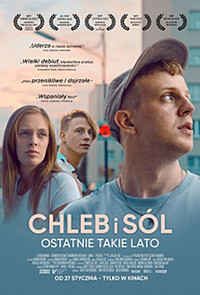| SHADOWS ON THE WALL | REVIEWS | NEWS | FESTIVAL | AWARDS | Q&A | ABOUT | TALKBACK | |||||||||||||||||||||||||||||
 Shadows off the beaten path Shadows off the beaten pathIndies, foreign, docs and shorts...
On this page:
BREAD AND SALT |
HORSEPLAY |
SICK OF MYSELF
| |||||||||||||||||||||||||||||
| See also: SHADOWS FILM FESTIVAL | Last update 16.Apr.23 | |||||||||||||||||||||||||||||
|
Bread and Salt Chleb i Sól Review by Rich Cline | 
  Is it streaming?
| 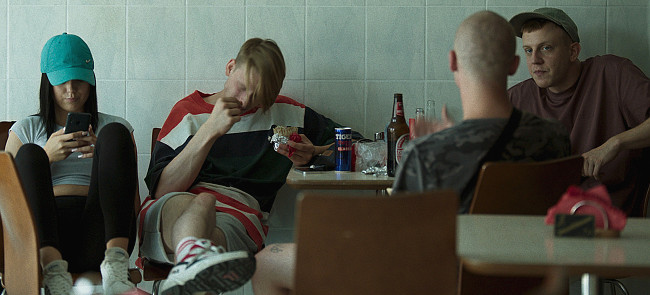 Bracingly shot in observational style, this Polish drama gets up close to its characters even as it neglects the narrative. It's an often harrowing depiction of a small town where young people think it's cool to deal in racism, bigotry and bullying. Writer-director Damian Kocur has a terrific eye for real-life interaction, so the thoughtful central character draws us in, even if his journey remains stubbornly off-camera. Returning from his music studies in Warsaw for the summer break, Tymek (Tymoteusz Bies) encourages his teen brother Jaca (Jacek Bies) to continue with school so he too can attend university. But Jaca wants to stay here with his girlfriend Ania. As they hang out with friends in the local kebab shop, Tymek is shocked by their violently racist behaviour towards the Arab staff, particularly Youssef, who appears to be gay. But Tymek remains silent about this, laughing at their jokes and flirting with Nicola, even though he clearly doesn't intend to go further. It's strongly hinted that Tymek is gay, but this is never addressed in the writing or direction, an approach that leaves the story frustratingly difficult to connect with. He clearly has sympathy with Youssef, and makes an effort to befriend him, but the script simply leaves it there. Instead, Kocur centres on documentary-style scenes of this thuggishly macho group of boys (and a couple of girls) as they party, swim in a local lake, hang out at home, drink, smoke and torment anyone who doesn't look like them. These scenes have a narrative momentum, but they also feel rather random and incomplete. The non-professional cast is almost startlingly authentic, beginning with the real-life sibling connection between Tymoteusz and Jacek Bies. The actors play scenes beautifully, finding rhythms that lead to strong camaraderie and also often unnerving conflicts. The rest of the cast is uncredited, but each distinctive role has tremendous edge that gives the film's narrative an inexorable sense of impending menace. And as the vile attitudes become stronger, only Tymek and Youssef seem to have souls. With such an unflinching approach, Kocur has created a film that has real power as a document of a place and time. Indeed, the script is based on true events, which makes it that much more deeply disturbing. It's darkly worrying to watch young people who are this violent in their intolerance of anyone who's even slightly different. So what the film has to say about society is important and rather terrifying. And stronger storytelling might have made it involving and moving.
|
| Horseplay Los Agitadores Review by Rich Cline | 
| 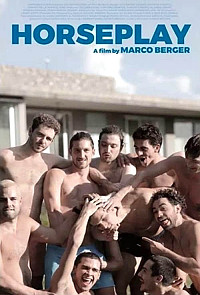 dir-scr Marco Berger prd Marco Berger, Murray Dibbs with Bruno Giganti, Agustin Machta, Franco de la Puente, Ivan Masliah, Facundo Mas, Ivan Benitez, Carlos Carneglia, Denis Corat, Jordan Romero, Fernando De Simone, Agustin Verdino, Melissa Falter release UK Mar.23 flare 22/Argentina 1h42   Is it streaming?
| 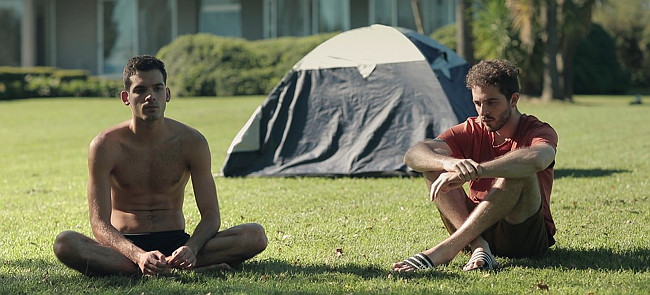 Argentine filmmaker Marco Berger continues to provocatively explore the nature of masculinity in this loosely unstructured comedy-drama about a group of friends who play very close to the boundaries. The meandering pace conceals a startling swell of very dark emotions, from toxic machismo to self-loathing homosexuality. These things are depicted in ways that force the viewer to think, continually blurring the lines society says are neatly cut and dried. With balmy summer weather over the Christmas holiday in Argentina, a group of guys in their mid-20s gather in a private suburban home to lounge around the pool and play pranks on each other. Most of these concern taking "homo-photos" of each other in compromising sexual positions. When forwarded to friends, these cause problems with their girlfriends, but they're having too much fun to care. Amid all of this, Poli (de la Puente) becomes increasingly distant from his pals, secretly meeting up with Andy (Machta) for sex, although Andy insists he's not gay, just horny. Berger's sexy, observational style is often unnerving, as it captures moments that are bracingly unfiltered. Of course boys will be boys, but each gay joke that is made has an insidious underlying impact on somebody. So not everyone can just laugh these things off, because the deeper meanings cut sharply to the core. This means that while there's a generally raucous tone to the boyish antics, there's also a growing sense of menace that emerges in a couple of violent incidents that take place just outside the camera's gaze. Each actor is excellent at finding intimate emotional details even as they throw their whole bodies into the fray. The large ensemble cast makes it a bit tricky to get fully involved in what happens along the way, although each of the men (as well as the women and others who drop by for visits) develop their own presence on-screen. This creates the improvisational feel of a reality show in which only a few events have been scripted. As usual, Berger puts many bare bodies on display along the way, as these guys have no qualms about lounging around naked together. Of course, this cleverly feeds into Berger's central idea exposing the myth of a straight society in which divergence is a problem. Macho posturing is clearly even more dangerous, on far more levels. Berger may be the only one out there peeling back these layers with such bracing honesty, so this film comes with a startling dose of urgency.
|
| Sick of Myself Syk Pike Review by Rich Cline | 
| 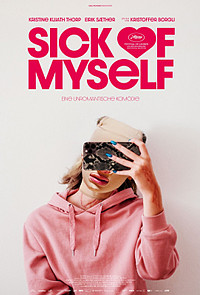 dir-scr Kristoffer Borgli prd Dyveke Bjorkly Graver, Andrea Berentsen Ottmar with Kristine Kujath Thorp, Eirik Saether, Fanny Vaager, Fredrik Stenberg Ditlev-Simonsen, Sarah Francesca Braenne, Ingrid Vollan, Steinar Klouman Hallert, Andrea Braein Hovig, Frida Natland, Guri Hagen Glans, Henrik Mestad, Anders Danielsen Lie release Nor 9.Sep.22, US Sep.22 ff, UK 17.Apr.23 22/Norway 1h35 CANNES FILM FEST  Is it streaming?
| 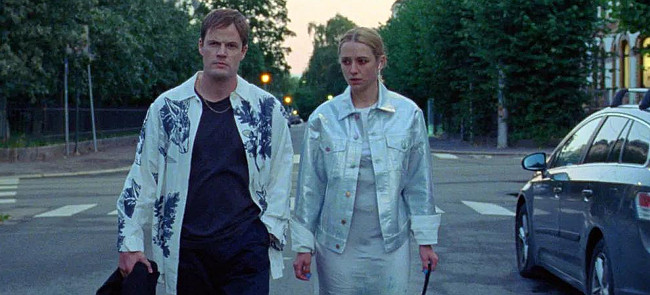 Pitch black comedy infuses this Norwegian drama, which cleverly grapples with a generation's desperate need for attention. Set in Oslo's art scene, it combines jagged wit with often disturbing subtext. Writer-director Kristoffer Borgli creates astonishing characters who seem to have ice in their veins, which quietly tilts the narrative into horror movie territory. So while the irony is laid on a bit thickly, the film carries a strong wallop. In an almost absurdly competitive relationship, Signe (Thorp) and her boyfriend Thomas (Saether) delight in stealing expensive things and showing off to their friends, or in Thomas' case using them in his sculptures. Working in a coffee shop, Signe becomes increasingly jealous of Thomas' success as an artist. So she shamelessly begins feigning medical conditions to steal focus from him, tracking down a dangerous drug so that she can elicit sympathy with nasty physical reactions. She gets her journalist friend (Vaager) to write a piece about her, but she may have taken this too far. Maintaining Signe's chilly perspective allows the bone-dry humour to take on an almost subliminal emotionality. This exists mainly in the rivalry bubbling up between Signe and Thomas, which reveals their individual insecurities as well as an offbeat mutual affection. The narrative is punctuated with outrageously pointed fantasy sequences in which Signe has often wildly delusional visions of the outcome of her behaviour, including her own funeral. Clearly, sometimes she doesn't know what's real and what isn't. Thorp superbly underplays Signe's desperation to be noticed, even as her behaviour becomes frighteningly disturbing. So it's difficult not to think she deserves some of the nastier consequences. Saether's passive-aggressive Thomas is just as bad, and the actor effortlessly plays the nice guy while layering in some shocking viciousness. They have remarkably jagged chemistry together, closely connected by their need for an audience. And the supporting cast plays it equally straight, unflinching even when things become excessive. As it satirises the lengths people will go to gain attention, the film goes over the top without ever cracking a smirk. Events play out with deadpan energy, adding insight into questions about who really cares about you, as opposed to those who show performative concern. And perhaps even more resonant is the way the story explores lengths people can go to just to know that someone cares. Most will never push things remotely this far, but Borgli's witty hyperbole is an astute provocation.
| 
See also: SHADOWS FILM FESTIVAL © 2023 by Rich Cline, Shadows
on the Wall
HOME | REVIEWS | NEWS | FESTIVAL | AWARDS
| Q&A | ABOUT | TALKBACK | | ||||||||||||||||||
